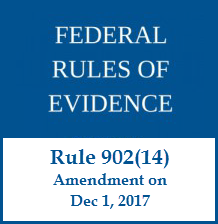Federal Rule of Evidence 902(13)(14) is now in effect and is already significantly impacting computer forensics and eDiscovery collection practices. We are now seeing multiple case citations of FRE 902(13)(14) in published court documents, and several states adopting the rule. Baker Hostetler, a prominent AMLaw 100 law firm, recently weighed in, stating that amended Rules 902(13)(14) “may incentivize parties to more aggressively challenge authenticity where it is apparent that an opponent is unable to make the pretrial certification envisioned by the amendments.” There is now at least one case example fulfilling that prediction. (More on that below). 
To review, FRE 902(14), which is particularly relevant to social media and internet evidence, provides that electronic data recovered “by a process of digital identification” is to be self-authenticating, thereby not routinely necessitating the trial testimony of a forensic or technical expert where best practices are employed. Instead, such properly collected electronic evidence can be certified through a written declaration by a “qualified person,” attesting that they verified the hash value of an offered item of electronic evidence and that it was identical to the original.
A detailed overview of Rule 902(14) can be found here.
A sample Rule 902(14) written certification can be found here.
The following states have amended their rules of evidence to allow for a provision identical or nearly identical to FRE 902(13)(14):
Arizona (Arizona Rule of Evidence 902(13)(14)).
Illinois (Illinois Rule of Evidence 902(12)(13))
North Dakota (North Dakota Rule of Evidence Rule 902(13)(14))
Pennsylvania. (Pending, expected to be formally enacted later in 2019).
The Arizona statute includes an additional and very notable requirement set forth in the accompanying official note to Rule 902(14), stating: “In order to provide the adverse party with an opportunity to properly analyze the issue of authenticity, the “record” provided by the proponent of the ESI evidence must include the metadata for the material in question if reasonably necessary to assess the material’s authenticity.”
This is only statue I am aware of that mandates by default the production of metadata associated with an item of electronically stored information.
In federal court, no published court decisions applying Rules 902(13)(14) are currently available. However we are seeing its application in filed court documents and briefs, which are accessible with Lexis, Pacer or Westlaw subscriptions.
In Elliot Kremerman vs. Open Source Steel, LLC, et al. (C17-953-BAT, US Dist. Ct. W.D. WA, 2018 WL 5318583), the plaintiff successfully opposed Open Source Steel’s (OSS) summary judgment motion. Plaintiff lodged several evidentiary objections in its opposition briefs, including to screen shots of Facebook evidence offered by OSS. The Plaintiff pointedly criticized OSS for not utilizing FRE 902(14): “While it is true that under Rule 902(14) certain certified electronic data, ‘authenticated by a process of digital identification, as shown by the certification of a qualified person’ is self-authenticating, OSS has made no attempt to meet this standard here.” (at pg 2)
In United States vs. Driscoll, 2018 WL 5263520 (D.D.C.), Federal prosecutors brought a pre-trial evidentiary motion based on FRE 902(13), seeking to streamline admission of government maintained military internet archives with written certifications instead of relying on a live witness. The crux of the motion was set forth as follows:
Recently, the Federal Rules of Evidence were amended to allow authentication, previously provided by a live witness in the cases cited above, to be provided by a certification. Federal Rule of Evidence 902(13) allows “a record generated by an electronic process or system that produces an accurate result, as shown by a certification of a qualified person that complies with the certification requirements of Rule 902(11) or (12).” certified by Fed. R. Evid. 902(11), Just as business records are certified by Fed. R. Evid. 902(11), an electronic record is also deemed to be self-authenticating and requires no extrinsic evidence of authenticity for it to be admitted into evidence, as long as there is a “certification of a qualified person” that is consistent with the requirements of Rule. 902. See Fed. R. Evid. 902(13) (2017 amendment). (at pp 4-5).
The Government’s motion was successful.
We will continue to monitor material developments with Rule 902(13)(14) and other legal developments involving social media and internet evidence on this blog.
